DAVE'S DIARY - 11 APRIL 2016 - MERLE HAGGARD OBITUARY
BEER CAN HILL CREATOR MERLE DIES ON 79 TH BIRTHDAY
“Well, I learned how to walk and I learned how to run in Bakersfield/ should've done time over things I'd done in Bakersfield/ I tasted my first taste of romance in Bakersfield/ I learned how to fight and I learned how to dance in Bakersfield/ dancin' on Beer Can Hill , overlooking Bakersfield/ remembering my first thrill/ dancin' on Beer Can Hill .” - Beer Can Hill - Merle Haggard.
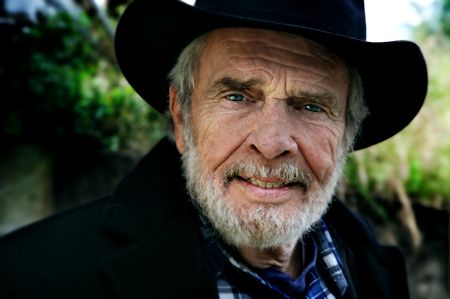 |
When former Californian convict and country legend Merle Haggard toured here in 1996 it was manna from heaven for aspirant radio broadcaster Nu Country FM.
Haggard's current hit was Beer Can Hill so we had a perfect theme tune for our station adjacent to the rustic Peacock Inn watering hole on Rucker's Hill in inner northern Melbourne suburb Northcote.
Merle recorded personalised station IDS in an exclusive Nu Country FM interview before headlining an all-star concert at Myer Music Bowl.
Haggard performed with his veteran band The Strangers featuring Bonnie Owens - former singing spouse of both the late Buck Owens and Merle.
The concert attracted an enthusiastic audience but the touring costs - including hiring an extra smoking carriage on the train to Adelaide - were no financial pleasure for promoter Wally Bishop who also toured Texan Red Steagall and the Coleman County Cowboys here in the late seventies.
Wally retreated to become tour manager of a Chinese circus and Merle returned to California.
And, of course, the Beer Can Hill studio of Nu Country FM burned down on June 26, 2000, before it was resurrected at the Paris, Texas, end of Collins St in the Melbourne CBD.
Merle suffered protracted health issues but continued to be a music staple when the station morphed into Nu Country TV in 2003 on Channel 31/Digital 44.
MERLE PREDICTED DEATH DATE BUT MADE IT THROUGH DECEMBER
“Got laid off down at the factory/ and their timing's not the greatest in the world/ heaven knows I been working hard/ wanted Christmas to be right for daddy's girl/ I don't mean to hate December/ it's meant to be the happy time of year/ and my little girl don't understand/ why daddy can't afford no Christmas here.” - If We Make It Through December - Merle Haggard.
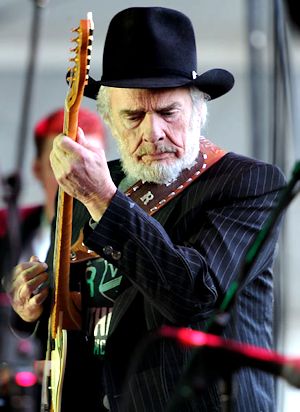 |
Haggard predicted his death on his 79th birthday on April 6 according to Ben - youngest son and lead guitarist in Merle's band until his death. “A week ago, dad told us he was gonna pass on his birthday, and he wasn't wrong,” Ben wrote after the patriarch's passing at the Lake Shasta family ranch near Redding in Palo Cedro, California. “An hour ago, he took his last breath surrounded by family and friends.” Ben was lead guitarist before Merle postponed tour dates with recording partner Shotgun Willie Nelson, now 82, after a bout of pneumonia. Merle suffered serious health issues since the 1990s - he underwent angioplasty in 1995 for clogged arteries and received two heart stents in 1997. He suffered herniated discs in his lower back in 2002 and in 2008 had lung-cancer surgery. |
Merle was also hospitalised with pneumonia in 2012, 2015 and 2016.
“I guess I was nearly dead,” Haggard said of his 2015 hospital stay when diagnosed with double pneumonia in both lungs.
“They couldn't tell whether the cancer returned or whether I just had pneumonia. They had to wait until they got the pneumonia under control before we could tell, so it's been kind of a tough couple of weeks.”
Jackie Autry - wife of the late Gene Autry - talked Haggard into going to the hospital.
“We were up here doing a show, and I tried to go out, and I couldn't do it,” he recalled at the time.
“And she talked me into coming into this hospital and getting some help.”
Haggard thanked doctors and nurses who helped him, his band “for puttin' up with me,” and fans who sent prayers “because there have been prayers all over the world, and I want to thank the fans for doing that, because it certainly got the job done.”
The country legend also thanked God, “for allowing me to have another Christmas.”
Even though Haggard made it through December it was a short reprieve.
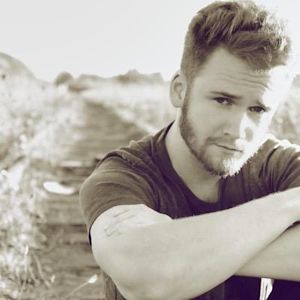 |
“He loved everything about life, and he loved that every one of you gave him a chance with his music,” son Ben revealed. “He wasn't just a country singer. He was the best country singer that ever lived.” Ben Haggard also shared a black-and-white photo on the Internet of himself and his father holding hands. Ben's mother is Theresa Ann Lane - Haggard's fifth and last wife. Haggard and Lane, who wed in 1993, also had a daughter, Janessa. Merle was wed to first wife Leona Hobbs from 1956 to 1964. |
They had four children - Dana, Marty, Kelli and Noel.
Marty and Noel became country singers.
Singer-songwriter Bonnie Campbell Owens was Haggard's second wife between 1965 and 1978.
She remained in his band after they divorced and was bridesmaid when Merle wed third wife - singer-songwriter Leona Williams - in a marriage that lasted from 1978-1983.
The Hag next married Debbie Parret in 1985 and divorced her in 1991.
Bonnie Owens and Leona Hobbs both died in 2006.
FROM OKIE CHURCH OF CHRIST TO SAN QUENTIN
“A canvas-covered cabin in a crowded labor camp/ stands out in this memory I revive/ cause my Daddy raised a family there/ with two hard-working hands/ and tried to feed my mother's hungry eyes.” - Mama's Hungry Eyes - Merle Haggard.
Merle was a permanent fixture on country charts for four decades.
He is a member of the Country Music Hall of Fame and Nashville Songwriters Hall of Fame and recipient of a Grammy Lifetime Achievement Award and a Kennedy Centre honoree.
Merle's life reads like a real country song - his parents were Okie migrants to California during the Great Depression after an arsonist torched their house and barn in 1935.
Born Merle Ronald Haggard on April 6, 1937, he was raised in a converted Santa Fe Railroad boxcar in Oildale, near Bakersfield, in California.
Father James died of a stroke when Merle was nine.
Merle's mother - the former Flossie Mae Harp a strict and pious member of the ultraconservative Church of Christ - took a bookkeeping job to provide for her three children.
But Haggard became wild and rebellious as a youth, involved in petty theft, writing bad cheques and riding the rails as a hobo.
He was sent to juvenile-detention facilities and reform schools several times for shoplifting, truancy, robbery and other crimes but this failed to curb his ways.
An encounter with Lefty Frizzell led him to start performing music professionally.
A school dropout, he also worked as a teenage farmhand, oil field worker, truck driver and short-order cook.
Haggard was arrested in 1957 for attempted burglary and sentenced to 15 years in San Quentin State Prison in California.
Merle and his mates broke into a ritzy Bakersfield restaurant through the rear kitchen door when the dining room at the front was still open and serving meals.
The catfish were frying, steaks sizzling and dessert being prepared when the bemused owner saw splinters fly as a crowbar forced the back door of his crowded kitchen.
Haggard's hombres were operating on “tequila time” - they thought their nocturnal entrée was 3 am but police logged the alarm call at 10.30 pm.
Mine host stepped outside and invited the inebriated intruders to join him for dinner while staff called police.
His invite was cordial - "why don't you boys just come around to the front door like everybody else?"
The Hag's sidekicks declined their invite and made a second fatal mistake when cops found a stolen safe in their getaway car.
“We were trying to break into the back end of this joint that we didn't realise belonged to a friend,” Haggard told me in an interview on the eve of his 1996 Australian tour.
“We were just trying to get in to get some beer. We were drunk on our butts on wine and didn't realise we were trying to break in. We took off running, jumped in the car and sped away with the lights off. When the cops stopped us there was some stuff in there from another burglary. They took me to gaol for that.”
Merle was arrested and charged with burglary.
During his incarceration he was invited to join a Horse Of Troy escape from San Quentin in a judge's desk.
“Jimmy Kendrick worked in the furniture department and when they put the last piece on the desk it was the day that it was to be shipped to San Francisco to the judge's chambers,” Merle revealed.
“Jimmy taught me how to go and I thought it was a neat thing to add to my experience. There was room for two people in there. I'm glad I didn't go.”
Kendrick, a lifer known as Rabbit, escaped without Haggard and eluded capture until he was caught after fatally shooting a state trooper.
Convicted of murder, Rabbit was sent to the gas chamber at San Quentin, and Haggard wrote a song for him, the death-row ballad Sing Me Back Home .
Merle turned 21 in the penitentiary as convicted felon No A-45200.
He vividly recalled sharing a death row cell block with infamous convicted kidnapper Caryl Chessman for making home brew.
“I talked to Caryl once,” Merle told me of the Red Light Bandit kidnapper who was executed on May 2, 1960.
“We could hear condemned prisoners talk. He said ‘you wouldn't believe what I got in the mail - a life insurance policy.' He had a 60 day stay. I really hated it when they executed him.”
In 1958, Merle attended a prison performance by Johnny Cash, which deepened his commitment to a country career.
These events all led him to turn his life around.
While locked away Haggard took high-school equivalency courses, performed in the prison country band before he was paroled at 22 in 1960.
CLICK HERE for more extracts of the 2006 interview in The Diary on June 14, 2010.
BUCK AND BONNIE AND MAMA
“And I turned twenty-one in prison doing life without parole/ no one could steer me right but mama tried, mama tried/ mama tried to raise me better, but her pleading I denied/ that leaves only me to blame 'cause mama tried/ dear old daddy, rest his soul/ left my mom a heavy load/ she tried so very hard to fill his shoes/ working hours without rest/ wanted me to have the best/ she tried to raise me right but I refused.” - Mama Tried - Merle Haggard.
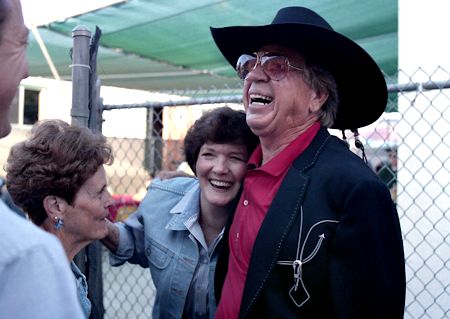 |
For the rest of Merle's life he was haunted by memories and nightmares of his life in prison.
Upon release he dug ditches and worked as an electrician's assistant.
But he was soon entertaining in Bakersfield nightclubs and signed by independent imprint Tally Records.
Merle performed smaller bars and later larger rooms like the Blackboard where he met Bonnie Owens - a cocktail waitress who had been married to Buck Owens.
He debuted on charts on Tally with his 1963 version of Wynn Stewart's yearning Sing a Sad Song.
The Owens-Haggard duet Just Between the Two of Us reached Top 40 in 1964 and they married in 1965.
Merle scored his first top-10 hit in 1965 with songwriter Liz Anderson's All My Friends Are Gonna Be Strangers .
Haggard named his award-winning band The Strangers as a salute to his 1965 hit.
Capitol Records took over his recording contract and producer Ken Nelson took a hands off approach to Haggard and his musical vision.
His songwriting include classics Mama Tried, Sing Me Back Home, Okie From Muskogee, Hungry Eyes , Workin' Man Blues, If We Make It Through December and Big City.
Merle's 1968 hit Today I Started Loving You Again has been recorded by 400 artists.
His recorded legacy is vast and varied - he explored blues, swing, pop, folk, gospel, honky-tonk, rockabilly and other roots genres.
Haggard respected country tradition and recorded tributes to Jimmie Rodgers (1969), Bob Wills (1970) and Elvis Presley (1977).
He recorded with The Texas Playboys, Mother Maybelle and The Carter Sisters, George Jones, Willie Nelson, Ray Price and Ernest Tubb.
The Hag scored 112 chart songs, 71 top-10 hits and 38 #1 smashes from more than 90 albums.
Liz Anderson also wrote Haggard's first No. 1 hit, the seemingly autobiographical The Fugitive .
Ironically, at the time, she knew nothing of his prison past.
By then Merle was also charting with his own songs.
Swinging Doors (1966), The Bottle Let Me Down (1966), I Threw Away the Rose (1967), Branded Man (1967), death-row ballad Sing Me Back Home (1967), The Legend of Bonnie and Clyde (1968), Grammy Hall of Fame winner Mama Tried (1968), I Take a Lot of Pride in What I Am (1968), Hungry Eyes (1969) and iconic Workin' Man Blues (1969) were all top-10 hits written by Haggard in the 1960s.
The California based Academy of Country Music honoured him with nine awards in 1965-69 and four more times in the 1970s.
Along with Buck Owens, Red Simpson and Wynn Stewart, Merle Haggard was a cornerstone of The Bakersfield Sound.
It featured bright-sounding Telecaster electric guitar leads, aggressive production touches and a more edgy approach than contemporary Nashville Sound records and celebrated California country's heyday.
Another exponent was Bonnie Owens - Haggard's duet partner, backup singer, co-writer and second wife.
MERLE AND THE KINKSTER
“We don't smoke marijuana in Muskogee/ we don't take our trips on LSD/ we don't burn our draft cards down on Main Street/ we like living right and being free.” - Okie From Muskogee - Merle Haggard.
In 1970 Merle's Okie From Muskogee was named Single of the Year by the CMA.
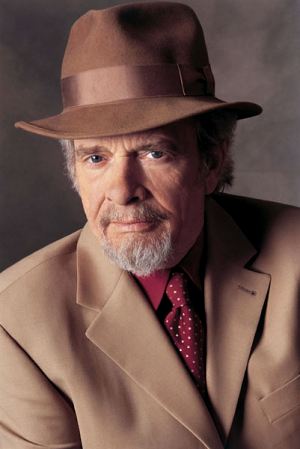 |
The controversial hippie-bashing song was the voice of the people President Nixon called The Silent Majority. “I was dumb as a rock when I wrote Okie From Muskogee ,” Haggard told Americana magazine No Depression in 2003. “I sing with a different intention now.” Okie also prompted singing Texan crime novelist Kinky Friedman's pungent parody Asshole From El Paso that earned an injunction from Merle's publisher Buck Owens. The Kinkster changed his album title to Lasso From El Paso. Haggard followed Okie with even more redneck The Fightin' Side of Me . Despite that Haggard won a healthy counterculture following with tributes such as I'll Fix Your Flat Tyre, Merle , by Pure Prairie League , featuring Vince Gill, Girl Haggard, More Haggard Than Merle and Sydney singer Rosemary Rae's tune Making Love To Merle. |
The Grateful Dead , Joan Baez, Byrds , Everly Brothers, Flying Burrito Brothers and many others recorded his songs.
Haggard added to his political ambiguity - he wanted to release his interracial love song Irma Jackson as a single but this was vetoed by Capitol.
He was asked to endorse reactionary presidential candidate George Wallace, but refused, and returned to San Quentin to perform for the inmates in 1971.
By then Merle was one of the most famous country singers - honoured with a star in the Hollywood Walk of Fame in 1969. The CMA named him Male Vocalist and Entertainer of the Year for 1970 and California Governor Ronald Reagan granted him a full pardon in 1972.
Haggard entertained President Nixon at the White House the following year and appeared on the cover of Time magazine in 1974.
From 1973-1976 he scored nine consecutive No. 1 hits - his Let Me Tell You About a Song was the CMA Album of the Year for 1972.
CLINT EASTWOOD AND MOVIES AND TV SHOWS
“We're bar room buddies and that's the best kind/ nobody fools with a buddy of mine/ I'll laugh when you're happy and I'll cry when you're blue/ we're bar room buddies and we're doing fine/ so pour me another we got nothing but time/ old chug-a-lug-a-lugging bar room buddy of mine/ hell we're skirt chasing, tail kicking guitar picking, pool hustling/ old chug-a-lug-a-lugging bar room buddy of mine.” - Bar Room Buddies - Merle Haggard.
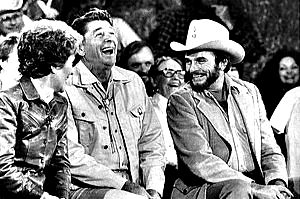 |
Merle was featured in films diverse as 1968's Killers Three , 1967's Hillbillies in a Haunted House and 1969's From Nashville With Music. He also had acting roles in TV movies Huckleberry Finn (1975) and Centennial (1979) and several TV series. Merle's duet partners during this period included Clint Eastwood.
|
They had a No. 1 hit in 1980 with Bar Room Buddies that appeared on the soundtrack of Eastwood's movie Bronco Billy that also featured Haggard's No. 1 solo hit Misery and Gin .
His early 1970s hit streak included a revival of Ernest Tubb's Soldier's Last Letter (1971), Someday We'll Look Back (1971), Daddy Frank (1971), Carolyn (1972), Hank Cochran's It's Not Love (But It's Not Bad ) (1972), I Wonder If They Ever Think of Me (1973), hard-luck recession anthem If We Make It Through December (1973) and Old Man From the Mountain (1974).
Merle also revived Dolly Parton's Kentucky Gambler (1974), Always Wanting You (1975), TV show theme song Movin' On (1975), The Roots of My Raising (1976) and the remake of Cindy Walker/Bob Wills western-swing favourite Cherokee Maiden (1976).
Haggard's commitment to constant touring was renowned.
Although he seldom spoke on stage his musicianship made him a master showman with humorous on-stage imitations of fellow stars Marty Robbins, Hank Snow, Buck Owens and Johnny Cash.
There were no set lists - neither his band nor the audience knew which song would be next.
Haggard's vocal performances took on a new depth after he began recording for MCA in 1976.
During the next four years, Haggard released timeless singles If We're Not Back in Love By Monday (1977), Ramblin' Fever (1977), I'm Always on a Mountain When I Fall (1978), My Own Kind of Hat (1979), The Way I Am (1980), I Think I'll Just Stay Here and Drink (1980) and Rainbow Stew (1981).
This era of his career found him continuing to champion blue-collar Americans and common man - journalists referred to him as a working-class hero.
He often addressed alcoholism, depression and middle age and was inducted into Nashville Songwriters Hall of Fame in 1977.
Merle also recorded duets with third wife - singer-songwriter Leona Williams.
He signed with Epic Records in 1980 and his decade-long tenure ignited another creative flowering - hit duets with George Jones (1982's Yesterday's Wine ) and Willie Nelson (1983's Pancho and Lefty that earned them a CMA Award).
Haggard won a 1984 Grammy for his version of Lefty Frizzell/Whitey Shafer standard That's the Way Love Goes.
His solo hits included My Favorite Memory (1981), Big City (1982), Are the Good Times Really Over (1982), Going Where the Lonely Go (1982), Someday When Things Are Good (1984), A Place to Fall Apart (1984), Natural High (1985), Kern River (1985), I Had a Beautiful Time (1986), Twinkle, Twinkle Lucky Star (1987) and A Better Love Next Time (1989).
He published his first autobiography, Sing Me Back Home , written with Peggy Russell, in 1981.
His second - Merle Haggard's House of Memories: For the Record - appeared in 1999.
Merle underwent financial, alcohol and drug difficulties during the 1990s but was inducted into the Country Music Hall of Fame in 1994.
He won a Living Legend honor at Music City News Awards in 1990 and Award of Merit at 1991 American Music Awards.
DUELLING TRIBUTE DISCS - TULARE DUST AND MAMA'S HUNGRY EYES
“Tulare dust in a farm boy's nose/ wondering where the freight train goes/ standing in the field by the railroad track/ cursing the strap on my cotton sack/ I can see mom and dad with shoulders low/ both of 'em pickin' on a double row/ they do it for a livin' because they must/ that's life like it is in the Tulare dust/ the California sun was something new/ that winter we arrived in '42/ and I can still remember how my daddy cussed/ the tumbleweeds here in the Tulare dust.” - Tulare Dust - Merle Haggard.
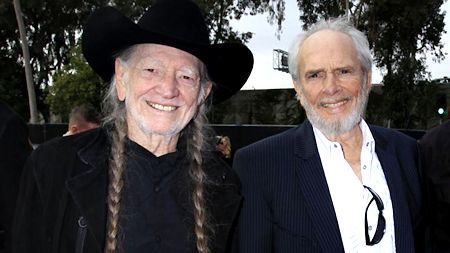 |
Two Haggard tribute albums were released in 1994.
Tulare Dust featured performances of his songs by Dwight Yoakam, Rosie Flores, Lucinda Williams, Billy Joe Shaver and other roots artists.
Mama's Hungry Eyes co-starred Emmylou Harris, Vince Gill, Brooks & Dunn, Alabama , Alan Jackson, Randy Travis, Pam Tillis and more.
In 1997 TNN aired a tribute-concert TV special Workin' Man that included Tim McGraw, Trace Adkins, John Anderson, Mark Chesnutt and others.
The emergence of the Americana music genre provided Merle with a career renaissance on albums that earned him strongly positive reviews.
These included 2000's If I Could Only Fly, 2001's Roots , 2002's The Peer Sessions , 2003's Like Never Before , 2004's Unforgettable , 2005's Chicago Wind, 2007's The Bluegrass Sessions , 2007's Working Man's Journey, 2010's I Am What I Am and 2011's Working in Tennessee.
Merle recorded for Curb, Epitaph, EMI, Audium, Vanguard and other imprints and was part of the all-star ensemble on 1998 Grammy-winning Same Old Train record.
He sang duets with Jewel (1999) and Gretchen Wilson (2005), toured with Bob Dylan in 2005 and played the Bonnaroo fest in 2009.
In 2007 Merle and Willie Nelson recorded with Ray Price on the critically applauded CD Last of a Breed .
His 2015 duet reunion album with Willie was the equally acclaimed Django and Jimmie .
The Dixie Chicks , Eric Church, Brooks & Dunn, Colin Raye, Shooter Jennings and Lynyrd Skynyrd all saluted him in lyrics of their songs.
In 2006 Haggard was honored as a BMI Icon with 48 BMI Awards that add up to over 25 million performances.
Also in 2006 he received the Grammy Lifetime Achievement Award.
The ACM gave him its Poet's Award in 2008 and he was presented with a Kennedy Centre Honor in 2010.
California State University in Bakersfield gave him an honorary degree in 2013 - a doctorate in fine arts.
The rugged individualist who resisted political labels remained an outspoken American patriot.
Merle opposed the war in Iraq in 2003 and defended the Dixie Chicks' free-speech rights.
He endorsed Hillary Clinton's presidential aspirations in 2007, then wrote a song expressing hope for Barak Obama's inauguration.
In recent years Merle became interested in conservation and environmental issues.
He did yoga, smoked pot, dabbled in herbal medicine and believed in UFO's and extraterrestrial life.
CLICK HERE for a Merle and Willie CD review in The Diary on July 6, 2015.
CLICK HERE for another Merle CD review in The Diary on November 26, 2006.